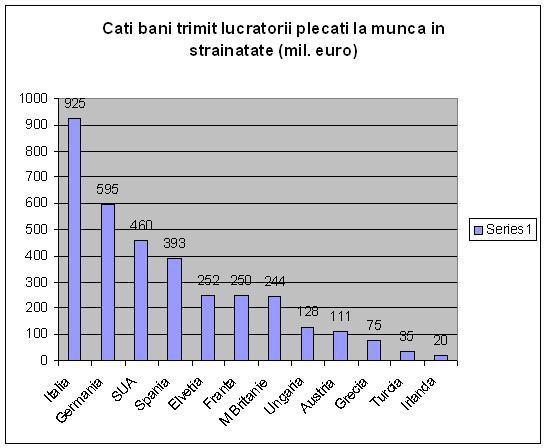According to data presented by the National Bank chief economist Valentin Lazea during a conference held at the Romanian Banking Institute, the Romanian workers in Italy are ranked first among in the remitters top, with 925 million euros (compared to 900 in 2012), followed by those in Germany - 595 (491) and those in the United States - 460 (593).
The big surprise seems to be offered by the workers in Spain rated second in the rankings after Italy in the period 2005 - 2010, but who in 2013 only sent 393 million euros, compared to half a billion in 2012 .
However, Spain is a country with a very high unemployment rate, so it's only natural they would turn less to the services of the Romanians or pay them little. The Iberian country last data indicate an unemployment rate of 25.1%, very close to the highest level in the EU, seen in Greece (26.5%).
The following states from where the Romanians send money to the children and elderly left at home are: Switzerland (252 million), France (250), Great Britain (224), Hungary (128), Austria (111), Greece (75), Turkey (35) and Ireland (20). All that adds up to 3.488 billion euros that the Romanians working abroad send which rose by a quarter the value of foreign direct investment to Romania.
Total cash inflows in Romania stood in 2013 at 4.23 billion euros, including transfers from workers and other people working abroad, down from 4.55 billion euros in 2012.
And Valentin Lazea points out that Romanians who migrated to work abroad have different profiles.
Those in the Southern area - Spain, Italy, Portugal and Greece - are less skilled and send smaller amounts of because their salaries are lower, even if they are many more.
Romanians in Germany, France and the UK have a higher degree of training and remit more money.
The third group is made up of Romanians working in the United States and Canada. They are highly skilled, which helps that the "few Romanians, but well paid in the U.S." send larger amounts of money "than the more migrants in Spain, but underpaid," the chief economist of BNR notes.
According to the National Institute of Statistics the number of emigrants is placed around the level of 2.5 million, compared to only one billion in 2002. And this issue has been subject for the IMF’s concerns. The Fund’s mission chief Jeffrey Franks, said: "There are many Romanians who are not activating in Romania, many young people. You need to bring them back."
Unfortunately, instead of being fully aware of the disservice done to the country by the workers departure, politicians have started to brag about the population exodus ..
Labour Minister Marian Sarbu, said, for example, that the balance on the trade account based on the money Romanians earn abroad is a minor benefit in addition to the social benefits.
At the same time, for the Polish leaders "social" meant to favor business environment to make it able to attract more foreign investors to create jobs, not send the workforce away from home. A business environment which in Romania is quite unfriendly not only to foreign investments but also to the Romanians investments.
And the more our small entrepreneurs get the impression that everything stands in their way at economic legislation level, the number of emigrants rises. This explains the increasing age of emigrants. They tried to do something in Romania first.
Unfortunately, abroad, they will not try to set up a business, but will remain with the same servant mentality that the environment in Romania has instilled them, joining the other 2.5 million of countrymen who contribute with most of their money to the GDPs of others, and only send home the "crumbs" left.
And the main reason that the business environment is hostile has to do with the fact that politicians do not want to see their party and state affairs damaged by investors coming from elsewhere who claim equal treatment with those who negotiated their entry with them.
The entire population cannot help by emigrate - individual by individual - after the investors who refused to pay the "protection fee", while Romania risk to lose on collections to its GDP.








